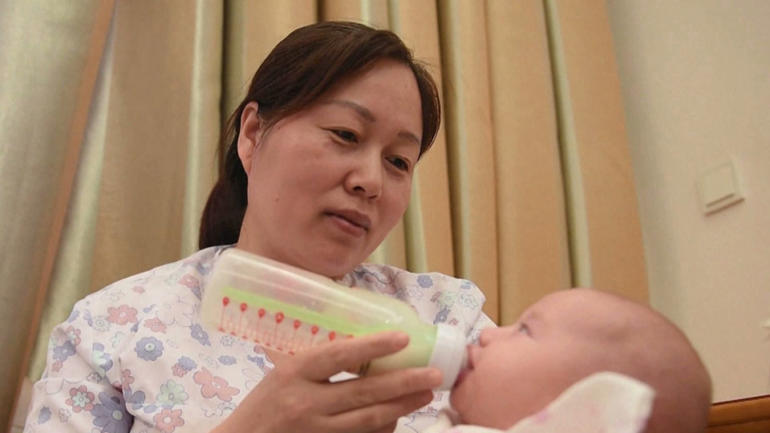The popularity of breastfeeding has been growing in the United States thanks in part to guidelines set forth by the World Health Organization, guidelines that the Trump administration reportedly tried to water down earlier this year. While most American women believe breast is best, they still face considerable challenges when trying to maintain a breastfeeding regimen.
CGTN’s Karina Huber reports.
When it comes to feeding your newborn baby, the consensus among world health experts is that breastmilk is the gold standard.
“It’s free. It is readily available. It is the perfect temperature and it’s the ideal nutrition for that particular baby,” said Elizabeth Rochin, VP of Nursing at the Association of Women’s Health, Obstetric and Neonatal Nurses.
Numerous studies have shown that babies who are breastfed exclusively for the first six months have fewer ear infections, respiratory illnesses and diarrhea. They also have less of a chance of developing allergies.
Moms who breastfeed benefit too. They recover from childbirth quicker and are less likely to develop breast and ovarian cancer later in life.
In 1981, the World Health Assembly adopted what’s called the “WHO code” to promote breastfeeding and restrict the marketing of breastmilk substitutes to new mothers to ensure they aren’t being misled and discouraged from breastfeeding.
“It’s not a legally binding document but the expectation is that manufacturers as well as healthcare providers are following these very specific regulations and guidelines,” said Rochin.
A majority of hospitals in the U.S. used to give out free formula. Now only roughly 30 percent of them do.
In 1971 only 25 percent of new American moms breastfed their infants. By 2016 it had ballooned to more than 80 percent. (insert graphic: source: CDC).
Breast is best is now the mantra and because of that it came as a shock to many that the United States reportedly tried to water down a resolution promoting breastfeeding at the World Health Assembly in Geneva this spring.
According to the New York Times, the U.S. delegation unsuccessfully tried to remove some of the wording in the resolution that calls on member states to “protect, promote and support breast-feeding” and limit the marketing of formula.
The report suggested the Trump administration was putting the interests of formula companies ahead of babies.
Trump denied the accusations in a tweet saying: “The U.S. strongly supports breastfeeding but we don’t believe women should be denied access to formula.”
The U.S. Department of Health and Human Services said it was concerned about stigmatizing women who cannot or choose not to breastfeed.
The consequences of formula use in the United States are minimal compared to developing countries – the industry’s fastest growing market.
Women in poorer countries are often falsely lead to believe formula is better or as good as breastmilk. Some are also ill-informed one how to use it. Because formula is expensive some moms dilute their it. When the water is tainted, it can lead to deaths.
In the U.S., 80 percent of women start off breastfeeding but by six months the number drops to 50 percent. That’s in large part because there is no federally mandated paid parental leave in the United States.
“It was the probably the hardest thing I’ve ever done,” said Kate Cannova, Advertising Executive.
Kate Cannova was back at work 12 weeks after giving birth to her son John. She was determined to maintain her breastfeeding regimen.
“I’ve pumped in clients’ offices in their lactation rooms, which was really a cleaning supply closet with boxes stacked to the ceiling and you’re crammed and you’re standing up and you’re holding the pump in your arms because there’s no table and there’s no sink and there’s no chair,” said Cannova.
She says a big problem is many employers don’t fully understand what it means to be a working breastfeeding mother.
“I’ve always said that breastfeeding is the most natural thing in the world but it does not come naturally to baby or to mom and it most certainly does not come naturally to everyone else around mom – not in the workplace,” said Cannova.
Andrew Bernstein discusses breastfeeding policy in the US
CGTN’S Rachelle Akuffo spoke to Andrew Bernstein about breastfeeding policy in the U.S.
 CGTN America
CGTN America

